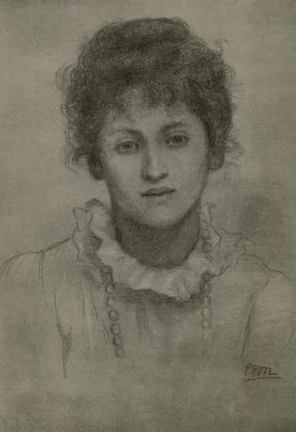Violet Hunt, born in 1862 in Durham in the north of England,was the daughter of Pre-Raphaelite landscape painter Alfred William Hunt and his wife, Margaret Raine Hunt, bestselling novelist and translator of the stories of the Brothers Grimm. Her parents took her to live in London when she was just three-years old and she grew up in Pre-Raphaelite circles. Violet was bright, vivacious and very beautiful. At thirteen, she was writing poetry for Century Magazine. Ellen Terry described her as ‘out of Botticelli by Burne-Jones’.

Violet Hunt from The Flurried Years (1926)
On one occasion, when Letitia Scott, wife of Margaret’s art tutor, William Bell Scott, invited Margaret, to come and meet ‘a wonderful young Irishman just up from Oxford’, she brought seventeen-year-old Violet along. Oscar Wilde, for it was he, flirted outrageously with Violet:
Beautiful women like you hold the fortunes of the world in your hands to make or mar,
he told her, adding conspiratorially:
We will rule the world – you and I – you with your looks and I with my wits.
Little wonder she thought herself ‘a little in love’ with him.
In her memoir, The Flurried Years (1926), Violet insisted that she had ‘as nearly as possible escaped the honour of being Mrs. Wilde’, adding:
I believe that Oscar was really in love with me – for the moment and perhaps more than a moment for Alice Corkran told me quite seriously that he had said to her quite seriously, “Now, shall I go to Mr. Hunt and ask him to give me little Violet?”
Oscar, who considered her, ‘the sweetest Violet in England’, called on the Hunts almost every Sunday for two years. When he went to America, Violet sought his mother out, hoping for news of her son:
Lady Wilde sits there in an old white ball dress, in which she must have graced the soirees of Dublin a great many years ago,
she wrote; she was not quite as sweet as she looked.
When Oscar returned from America with his hair freshly coiffed and curled, Violet decided he was, ‘not nearly so nice’ after all.
Although she adored the company of men, and described her life as ‘a succession of affairs,’ Violet Hunt never married. She would ‘snub eligibles on principle’, preferring married men since ‘no one could imagine that I wanted to catch them’. She could be terrifying: ‘I rather liked her,’ D.H. Lawrence admitted, adding: ‘She’s such a real assassin’.
Her many conquests included H.G. Wells, with whom she had an affair lasting a year when she was forty-four, and Somerset Maugham, but her most enduring love was for Ford Madox Ford; at thirty-six, he was eleven years her junior when they embarked on their lengthy affair. Violet’s once good opinion of Oscar may have been tainted by Ford’s dismissal of his writing as ‘derivative and of no importance’, although he did acknowledge ‘as a scholar he was worthy of the greatest respect’.

Violet Hunt & Ford Madox Ford
In later years, Violet remembered Oscar as:
…a slightly stuttering, slightly lisping, long-limbed boy, sitting in the big armchair at Tor Villa, where we lived then, tossing the long black lock on his forehead that America swept away, and talking – talking…
Oscar had always encouraged Violet to write. In time, she enjoyed an enviable reputation as a novelist, biographer and hostess of a thriving literary salon. Among her guests were Rebecca West, Ezra Pound, Joseph Conrad, Wyndham Lewis, D.H. Lawrence, and Henry James. Her interest in furthering the cause of women is reflected in the themes of her novels, the first of which, The Maiden’s Progress, was published in 1894. She joined the Women Writers’ Suffrage League in 1908, the year she helped Ford establish the English Review. Although she never published her memoir My Oscar, she did fictionalise him as fickle suitor Philip Wynyard in her semi-autobiographical novel Their Lives (1916).
When she died of pneumonia, aged seventy-nine, she left behind collections of poetry and short stories, seventeen novels, her memoirs of her time with Ford, a biography of Lizzie Siddal, six collaborations, two book translations, and numerous critical articles that were published in London newspapers and magazines.
Unlike that of many of her literary conquests, none of her work remains in print, although some of it is available to read online. Truly, she is one of Wilde’s Women.
Further Reading:
Violet: the story of the irrepressible Violet Hunt and her circle of lovers and friends – Ford Madox Ford, H.G. Wells, Somerset Maugham, and Henry James by Barbara Belford (New York, Simon and Schuster, 1990)
‘Aesthetes and pre-Raphaelites: Oscar Wilde and the Sweetest Violet in England’ by Robert Secor, Texas Studies in Language and Literature, Volume XXI, number 3 (Fall 1979)
The Flurried Years by Violet Hunt ( London, Hurst & Blackett, 1926), p.173
Also:


Thanks for this, I’m going to look to see if i can find some of her writings now.
Pingback: May 1883: Oscar Wilde Returns to London | Beside Every Man
Interest in Edward Heron-Allen and his friend Violet Hunt and his arch-enemy, Ford Maddox Ford. Well aware of their letters and conflicts. Any known photos together?
Affair strongly suggested, but not well documented. Any knowledge?